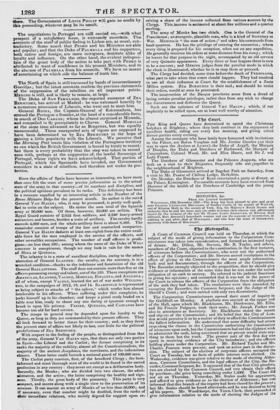Since the affairs of Spain have become so interesting, we
have more than once felt the want of some precise nformation as to the actual state of the army in that country—of its numbers and discipline, and the political opinions prevalent in its ranks. This deficiency has been in a measure supplied by an interesting article in the Number of the Revue Miiitaire Beige for the present month. Its author is the noted General VAN HALEN; who, it may be presumed, is pretty well quali- fied to write on the subject. He states the sum total of the Spanish army at 90,000 men. Of these, however, 30,000 are militia. The Royal Guard consists of 2,052 foot soldiers, and 2,240 heavy-armed cuirassiers and lancers, besides a train of artillery. The cavalry hardly exceeds 4,000 men, and the whole artillery force is about 8,500. The remainder consists of troops of the line and unattached companies. General VAN HALEN deducts at least one-eighth from the entire avail- able force for the men employed in the service of the officers, and other unwarlike occupations. The number of staff officers is prodi- gious—no less than 530; among whom the name of the Duke of WEL- LINGTON is conspicuous, though we may look in vain for the names of MINA Or QUIROGA.
The infantry is in a state of excellent discipline, owing to the admi- nistration of General LLANDER : the cavalry, on the contrary, is in a wretched condition—thanks to the indolence and fanaticism of the old General BALLASTEROS. The staff does not contain more than five or six officers possessing energy and talent, out of the 530. These exceptions are AMARILLAS, LLANDER, VALDEZ, MORILLO, ESTALETA, and ANGLONA ; all of whom, except VALDEZ, learned the art of war under WELLING- TON, in the campaigns of 1812, 13, and 14. SAARSFIELD is represented as being subject to attacks of " the spleen," which render him almost intolerable to his officers. When suffering under this complaint, he locks himself up in his chamber,' and keeps a pistol ready loaded on a table near him, ready to shoot any one daring or ignorant enough to break in upon his privacy. FREIRE, QUESADA, and CASTANOS have become too old for hard service.
The troops in general may be depended upon for loyalty to the Queen, as long as they are commanded by their present officers. They all look forward to better times for their country ; and, as they deem the present state of affairs not likely to last, care little for the political predelictions of ZEA BERMUDEZ. With respect to the feeling of the people, as distinguished from that of the army, General VAN HALEN says, that there are only two parties in Spain—the Liberal and the Carlist ; the former comprising in its ranks the majority of the nobility, almost all the Constitutionalists, the majority of the ancient Josephinos, the merchants, and the industrious classes. These latter could furnish a national guard of 100,000 men.
The Carlist party consists, first, of the beneficed Clergy ; the best- informed and most thorough men of the world to be found in the sacred profession in any country : theyeever act except as a deliberative body. Secondly, the Monks ; who are divided into two classes, the admi- nistrative, and the active ; the latter comprising the healthy and vigo- r:pus. Thirdly, the great body of the peasantry. This party is very compact, and moves along with a single view to the preservation of its revenue. It can muster an army of Monks of no less than 50,000; and if necessary, even that number might be doubled, from the ranks of -their immediate relations, who mainly depend for support upon re-- ceiving a share of the income collected from various sources by the Clergy. This income isastimated at about five millions and a quarter sterling.
The army of Monks has two chiefs. One is the General of the Franciscans ; anenergetic, -plausible man, who is a kind of Secretary at War. MERINO is " the man of action ;" and takes his commands from head-quarters. He has the privilege of entering the nunneries ; where every thing is prepared for his reception, when out on any expedition. He generally receives his orders at some distance from his camp ; which he leaves for that purpose in the night, accompanied by an old servant of very Quixotic appearance. Every three or four leagues there is sure to be a convent ; and MERINO judges from 'the peculiar mode in which the clock is illuminated, whether he is to stop there or proceed.
The Clergy had decided, some time before the death of FERDINAND, what part to take when that event should happen. They had resolved to use all their influence at Court for the establishment of a Juste Milieu system. ZEA BERMUDEZ is their tool; and should he resist their orders, would at once be prostrated.
The insurrection of the Basque provinces arose from a dread of losing certain peculiar privileges, rather than from any wish to change the Government and dethrone the Queen.
Such are the opinions of General 'VAN HALEN ; which, if not implicitly to be relied upon, are at least well worthy of attention.


















 Previous page
Previous page